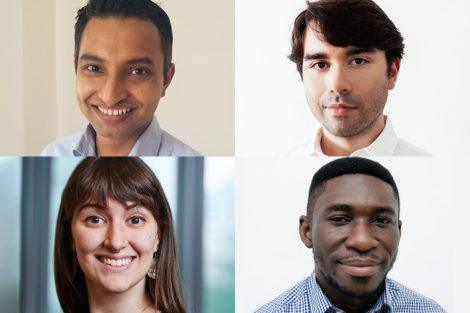September 18, 2020 – Four students from Harvard T.H. Chan School of Public Health were selected as 2020 Cheng Fellows of the New World Social Innovation Fellowship program at the Social Innovation and Change Initiative (SICI) at Harvard Kennedy School.
SICI develops research, pedagogical content, and educational programs that help students, citizens, and organizations around the world navigate the challenges of initiating and implementing social change. The New World Social Innovation Fellowship supports students—known as Cheng Fellows—with a demonstrated commitment to advancing progress on a social challenge through a project of their own design. Through weekly co-curricular programming, coaching, and seed funding, the fellowship provides a platform for students to develop and scale social-innovation efforts while in school and after they graduate. For the first time, the 2020 Cheng Fellows cohort represents students from across five Harvard schools: Harvard Business School, Harvard Graduate School of Education, Harvard Kennedy School, Harvard Chan School, and Harvard College.
The four Harvard Chan School Cheng Fellows and their projects include:
Bishal Belbase, MPH ’21, a student in global health from Nepal, is founder of Karma Health, a nonprofit that aims to provide high-quality, dependable access to health care in underserved regions. “As a primary care doctor, I saw young children die of simple infections because their parents didn’t have money with them or because they were too far from a hospital or someone who could guide them to one,” said Belbase. Witnessing such health care inequities in remote areas led Belbase and colleagues to create Karma Health, which is prototyping a three-way partnership that includes the private sector, local communities, and local governments. The model includes quality clinical care at a central municipal health facility, an outreach program to strengthen remote satellite clinics, proactive community-based care, and help in improving health service management. The municipality provides regulatory oversight and partial financial support.
Antón Castellanos Usigli, DrPH ’22, who is from Mexico and has lived in the U.S. since 2013, aims to reduce the rates of HIV and sexually transmitted infections (STIs) by creating community-based, sex-positive, and stigma-free spaces to connect gay and bisexual men to sexual health services through dating apps. “In 2016, I was working in a hospital in Brooklyn, New York, and I realized that in order to connect gay and bisexual men to sexual health services, I needed to have conversations with them through dating apps and invite them to access these services,” Castellanos Usigli said. “In just one month, I brought more than 20 men into the clinic for HIV/STI testing. I then standardized this outreach method for the clinic’s peer educators, and to date we have brought in more than 300 men for sexual health services.” Through the Cheng Fellowship, Castellanos Usigli will expand his work throughout the country.
Madison Esposito, MPH ’21, a student in health and social behavior and citizen of the Tyme Maidu Nation, located in California, is co-founder of the nonprofit Redbud Resource Group, which aims to elevate and celebrate Native resiliency, improve public health outcomes, and support allyship by developing Native-informed and -vetted science and history curricula. “My passion lies in Indigenous health and wellness, and my goal is to understand how we can support, empower, and improve our Native communities,” said Esposito. “Native peoples struggle with immense health disparities, but we also possess the traditional and cultural knowledge to overcome these disparities. Through establishing the Redbud Resource Group, I hope to help communities explore these strategies and transform their health.” Esposito is partnering with a fellow citizen of her tribe to work with tribal stakeholders to write, publish, and curate an education curriculum to uplift and amplify California Native voices and cultures, while fostering allyship between Native and non-Native communities.
Kwabena Lartey, MPH ’21, a student in global health from Ghana, is founder of Books for Him & Her, which aims to provide high-quality, comprehensive sexuality education to address the gap in knowledge faced by approximately 48% of young people in Ghana. “Drawing from my lived personal experiences,” said Lartey, “I knew the impact of this problem on the youth in my community and felt it was critical to address it.” In 2018, he founded aHnonymous, an organization that offers a safe space for Ghanaian adolescents to freely access sexual and reproductive health information, share health concerns, and seek counseling free from fear or stigma. He recently launched Books for Him & Her as part of this effort. “With support from the Kennedy School’s Social Innovation and Change Initiative team,” said Lartey, “we hope to connect with up to 1,000 young persons within the community, give them access to sexual health and educational resources in a fun and innovative way, and empower them to make responsible sexual health choices.”
